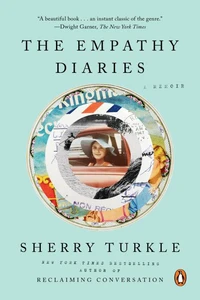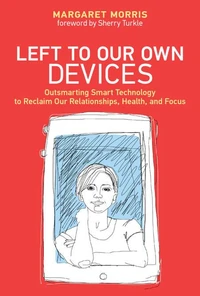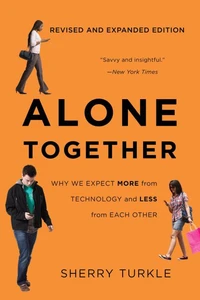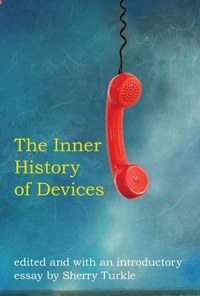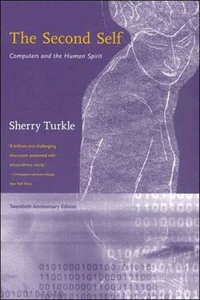Reclaiming Conversation. The Power of Talk in a Digital Age
Par :Formats :
Disponible dans votre compte client Decitre ou Furet du Nord dès validation de votre commande. Le format ePub protégé est :
- Compatible avec une lecture sur My Vivlio (smartphone, tablette, ordinateur)
- Compatible avec une lecture sur liseuses Vivlio
- Pour les liseuses autres que Vivlio, vous devez utiliser le logiciel Adobe Digital Edition. Non compatible avec la lecture sur les liseuses Kindle, Remarkable et Sony
- Non compatible avec un achat hors France métropolitaine
 , qui est-ce ?
, qui est-ce ?Notre partenaire de plateforme de lecture numérique où vous retrouverez l'ensemble de vos ebooks gratuitement
Pour en savoir plus sur nos ebooks, consultez notre aide en ligne ici
- Nombre de pages352
- FormatePub
- ISBN978-1-101-61739-7
- EAN9781101617397
- Date de parution06/10/2015
- Protection num.Adobe DRM
- Taille916 Ko
- Infos supplémentairesepub
- ÉditeurPenguin Books
Résumé
"In a time in which the ways we communicate and connect are constantly changing, and not always for the better, Sherry Turkle provides a much needed voice of caution and reason to help explain what the f*** is going on." -Aziz Ansari, author of Modern RomanceRenowned media scholar Sherry Turkle investigates how a flight from conversation undermines our relationships, creativity, and productivity-and why reclaiming face-to-face conversation can help us regain lost ground.
We live in a technological universe in which we are always communicating. And yet we have sacrificed conversation for mere connection. Preeminent author and researcher Sherry Turkle has been studying digital culture for over thirty years. Long an enthusiast for its possibilities, here she investigates a troubling consequence: at work, at home, in politics, and in love, we find ways around conversation, tempted by the possibilities of a text or an email in which we don't have to look, listen, or reveal ourselves.
We develop a taste for what mere connection offers. The dinner table falls silent as children compete with phones for their parents' attention. Friends learn strategies to keep conversations going when only a few people are looking up from their phones. At work, we retreat to our screens although it is conversation at the water cooler that increases not only productivity but commitment to work. Online, we only want to share opinions that our followers will agree with - a politics that shies away from the real conflicts and solutions of the public square.
The case for conversation begins with the necessary conversations of solitude and self-reflection. They are endangered: these days, always connected, we see loneliness as a problem that technology should solve. Afraid of being alone, we rely on other people to give us a sense of ourselves, and our capacity for empathy and relationship suffers. We see the costs of the flight from conversation everywhere: conversation is the cornerstone for democracy and in business it is good for the bottom line.
In the private sphere, it builds empathy, friendship, love, learning, and productivity. But there is good news: we are resilient. Conversation cures. Based on five years of research and interviews in homes, schools, and the workplace, Turkle argues that we have come to a better understanding of where our technology can and cannot take us and that the time is right to reclaim conversation. The most human-and humanizing-thing that we do.
The virtues of person-to-person conversation are timeless, and our most basic technology, talk, responds to our modern challenges. We have everything we need to start, we have each other. Turkle's latest book, The Empathy Diaries is available now.
We live in a technological universe in which we are always communicating. And yet we have sacrificed conversation for mere connection. Preeminent author and researcher Sherry Turkle has been studying digital culture for over thirty years. Long an enthusiast for its possibilities, here she investigates a troubling consequence: at work, at home, in politics, and in love, we find ways around conversation, tempted by the possibilities of a text or an email in which we don't have to look, listen, or reveal ourselves.
We develop a taste for what mere connection offers. The dinner table falls silent as children compete with phones for their parents' attention. Friends learn strategies to keep conversations going when only a few people are looking up from their phones. At work, we retreat to our screens although it is conversation at the water cooler that increases not only productivity but commitment to work. Online, we only want to share opinions that our followers will agree with - a politics that shies away from the real conflicts and solutions of the public square.
The case for conversation begins with the necessary conversations of solitude and self-reflection. They are endangered: these days, always connected, we see loneliness as a problem that technology should solve. Afraid of being alone, we rely on other people to give us a sense of ourselves, and our capacity for empathy and relationship suffers. We see the costs of the flight from conversation everywhere: conversation is the cornerstone for democracy and in business it is good for the bottom line.
In the private sphere, it builds empathy, friendship, love, learning, and productivity. But there is good news: we are resilient. Conversation cures. Based on five years of research and interviews in homes, schools, and the workplace, Turkle argues that we have come to a better understanding of where our technology can and cannot take us and that the time is right to reclaim conversation. The most human-and humanizing-thing that we do.
The virtues of person-to-person conversation are timeless, and our most basic technology, talk, responds to our modern challenges. We have everything we need to start, we have each other. Turkle's latest book, The Empathy Diaries is available now.
"In a time in which the ways we communicate and connect are constantly changing, and not always for the better, Sherry Turkle provides a much needed voice of caution and reason to help explain what the f*** is going on." -Aziz Ansari, author of Modern RomanceRenowned media scholar Sherry Turkle investigates how a flight from conversation undermines our relationships, creativity, and productivity-and why reclaiming face-to-face conversation can help us regain lost ground.
We live in a technological universe in which we are always communicating. And yet we have sacrificed conversation for mere connection. Preeminent author and researcher Sherry Turkle has been studying digital culture for over thirty years. Long an enthusiast for its possibilities, here she investigates a troubling consequence: at work, at home, in politics, and in love, we find ways around conversation, tempted by the possibilities of a text or an email in which we don't have to look, listen, or reveal ourselves.
We develop a taste for what mere connection offers. The dinner table falls silent as children compete with phones for their parents' attention. Friends learn strategies to keep conversations going when only a few people are looking up from their phones. At work, we retreat to our screens although it is conversation at the water cooler that increases not only productivity but commitment to work. Online, we only want to share opinions that our followers will agree with - a politics that shies away from the real conflicts and solutions of the public square.
The case for conversation begins with the necessary conversations of solitude and self-reflection. They are endangered: these days, always connected, we see loneliness as a problem that technology should solve. Afraid of being alone, we rely on other people to give us a sense of ourselves, and our capacity for empathy and relationship suffers. We see the costs of the flight from conversation everywhere: conversation is the cornerstone for democracy and in business it is good for the bottom line.
In the private sphere, it builds empathy, friendship, love, learning, and productivity. But there is good news: we are resilient. Conversation cures. Based on five years of research and interviews in homes, schools, and the workplace, Turkle argues that we have come to a better understanding of where our technology can and cannot take us and that the time is right to reclaim conversation. The most human-and humanizing-thing that we do.
The virtues of person-to-person conversation are timeless, and our most basic technology, talk, responds to our modern challenges. We have everything we need to start, we have each other. Turkle's latest book, The Empathy Diaries is available now.
We live in a technological universe in which we are always communicating. And yet we have sacrificed conversation for mere connection. Preeminent author and researcher Sherry Turkle has been studying digital culture for over thirty years. Long an enthusiast for its possibilities, here she investigates a troubling consequence: at work, at home, in politics, and in love, we find ways around conversation, tempted by the possibilities of a text or an email in which we don't have to look, listen, or reveal ourselves.
We develop a taste for what mere connection offers. The dinner table falls silent as children compete with phones for their parents' attention. Friends learn strategies to keep conversations going when only a few people are looking up from their phones. At work, we retreat to our screens although it is conversation at the water cooler that increases not only productivity but commitment to work. Online, we only want to share opinions that our followers will agree with - a politics that shies away from the real conflicts and solutions of the public square.
The case for conversation begins with the necessary conversations of solitude and self-reflection. They are endangered: these days, always connected, we see loneliness as a problem that technology should solve. Afraid of being alone, we rely on other people to give us a sense of ourselves, and our capacity for empathy and relationship suffers. We see the costs of the flight from conversation everywhere: conversation is the cornerstone for democracy and in business it is good for the bottom line.
In the private sphere, it builds empathy, friendship, love, learning, and productivity. But there is good news: we are resilient. Conversation cures. Based on five years of research and interviews in homes, schools, and the workplace, Turkle argues that we have come to a better understanding of where our technology can and cannot take us and that the time is right to reclaim conversation. The most human-and humanizing-thing that we do.
The virtues of person-to-person conversation are timeless, and our most basic technology, talk, responds to our modern challenges. We have everything we need to start, we have each other. Turkle's latest book, The Empathy Diaries is available now.





